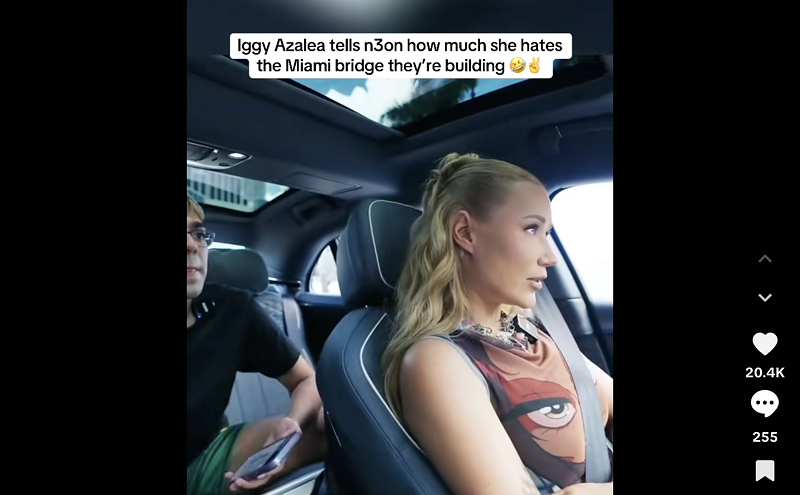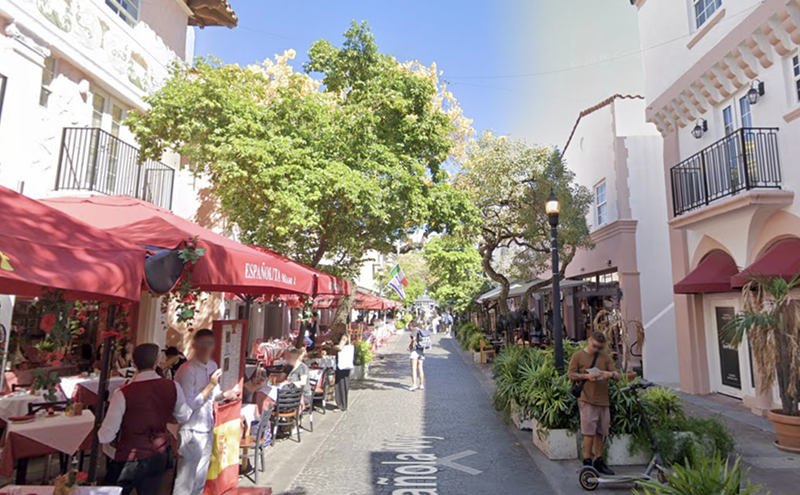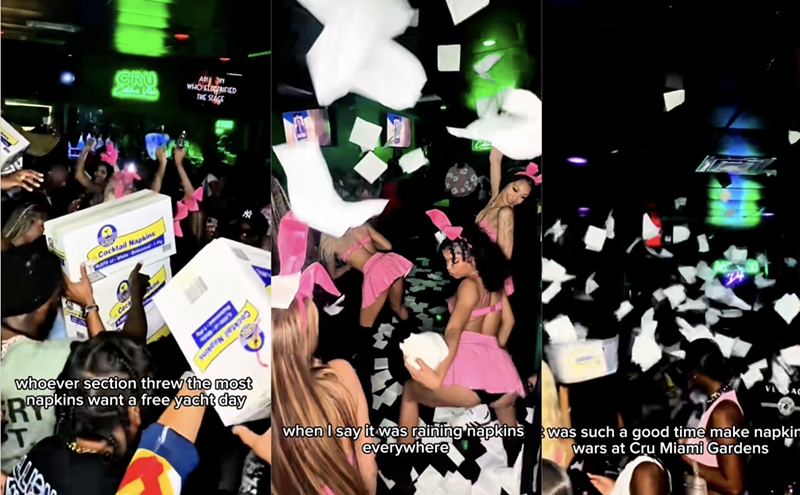More than just novel cuisine, what Guillén does with food manipulations is to set a stage for people to respond in different ways to meaningful aesthetic stimuli. It all happens within an environment particularly suited for aesthetic indulgence: TransEAT.
TransEAT is housed in a former commercial building on North Miami Avenue in Wynwood. In addition to sponsoring lectures and publications, TransEAT showcases artists, scholars, and chefs in special events, serving as a dynamic platform for understanding the significance of food traditions in all societies. The space serves as a studio/museum with a food-related permanent collection. It is also home for Guillén and her long-time companion and collaborator, conceptual artist and food performer Antoni Miralda, director of the Food Culture Museum in Barcelona (www.foodculturemuseum.com).
Miami's dilettanti and connoisseurs alike gather to savor whatever is on Guillén's menu. This is only the latest chapter in her lifelong love affair with food -- and with food as art. (See www.montseguillen.com.) A Catalan native, Guillén for years has operated traditional restaurants serving nontraditional fare. In the Eighties she made a name for herself with El Internacional in lower Manhattan. Then she was lured to Miami Beach, where she ran Shabeen, the Jamaican restaurant in Chris Blackwell's Marlin Hotel. She followed that with the memorable Big Fish Mayaimi on the Miami River. Two years ago she opened the Meeting Point Café in the Design District. Along the way, she and Miralda acquired the Wynwood space on North Miami Avenue.
At TransEAT events there's an enticing atmosphere of music, exotic soft lighting, the aroma of good food. Then the performance begins. To better understand what she does, we decided to interview Guillén at her place.
New Times: Montse, on your Website your "professional trajectory" page reads like an ethnological and entomological history. Do you agree?
Montse Guillén: [Laughs] You know, I've had this curiosity with the world's different cuisines for a while. It's definitely a cultural interest that never ends, and the more you travel the more you learn. I love the idea of transforming old recipes and conceiving of new ones.
Mention one memorable experiment.
Thirty years ago I experimented with wild nettle. The plant can give you a shock -- its little hairs sting. But they don't sting once they are boiled, and it actually tastes good.
Wow! I would've never eaten that. What does it taste like?
Like spinach. Though it's an ancient herb, for a long time we didn't pay attention to it. Later I found out it has medicinal qualities. I served it in my restaurant.
Tell me about your interest with insects.
Eight out of ten species on our planet are insects. Do you know what this means? Insects are the cuisine of the future. They have the right nutritious values and they reproduce easily. To incorporate them into a contemporary cuisine is just amazing. On my menu I have fried giant water beetles wrapped in bacon and figs, tempura scorpions, larvae-filled communion host, or yuca soup with grasshopper's legs. And for dessert, rosemary ice cream with big-assed ants. Entomophagy is already a fact in the United States [Los Angeles; Washington, D.C.] and in Europe [Germany, England].
Larvae-filled communion host! My mouth is watering.
When I traveled to Mexico I discovered how fond Mexicans are of insects. They eat escamoles [ant larvae], worms, and the chapulines [grasshoppers]. Writer Laura Esquivel [Like Water for Chocolate] had her personal assistant help us cook them, and I immediately decided to incorporate it in my recipes. Consider insects as pre-Hispanic cuisine.
All I know is that in our society, insects are generally perceived as dirty and thus inedible. In Kafka's Metamorphosis, Gregor Samsa wakes up one morning as vermin, the ultimate curse. In Clarice Lispector's The Passion According to GH, a woman's life is altered forever after she discovers an ancient cockroach. Instead you encourage people to eat them. Are you breaking taboos or is this cultural shock?
A bit of both. When you introduce a "new ingredient," it's always a shock. People don't realize that what they eat is a matter of habit. They eat what they've eaten all their lives.
What we like is a matter of habit?
Take stuff like bull's testicles, tongue, lamb's brains, pig's lung and liver, rooster's crests, veal's heart, and chicken's innards. For some people the animal's entrails are a symbol of filth. Unless they become exposed to it, they won't touch it. At TransEAT I love to see people's reaction to my dishes.
This idea of eliciting responses from people follows the best tradition of performance.
Definitely. Though I don't see myself as an artist, what we do is sort of big theater, where food plays a role. To be part of an experience of trying something new -- like a taste you had never thought of before, or even a taste you consider bizarre. I love the idea of breaking people's food taboos.
Do you find different reactions?
In my experience, men are more inclined to try something the first time. Women are more reserved. Children never ask questions, they just try it.
It seems to prove your point that we come to like what we're exposed to. Tell me, what's the purpose of these "entomophagous performances" at TransEAT?
Miralda and I are gathering material for a book of recipes with chef Juan Pablo Valencia [one of the chefs at Mosaico] and Jamaican photo artist Paul Stoppi. The book can be a way of publicizing what we do here and at the Food Museum in Barcelona -- and promoting entomophagy.
Our hominid ancestors probably ate grasshoppers before they ate mammoth's flesh. If entomophagy is an ancient practice, what's the difference between your cuisine and theirs?
I have an electric and a gas oven. [Laughs]
How has Miami received your idea?
I think Miami and Barcelona have welcomed it. I see more people willing to try new food trends. It's only a matter of time before you'll see insect tapas for less than a dollar. Now they are expensive! In Barcelona our idea was such a success. A week after our presentation, you'd see insects in the best markets at the Boquería and in the Ramblas.
My experience eating a water cockroach at TransEAT was unique, kind of metaphysical. I closed my eyes and tried to forget what I was eating in order to enjoy it for what it was.
[Laughs] For some the experience can be off-putting. There's always the understanding that you may not like it. I'd always say, "Try it. It's on the house." If they don't like it they don't have to pay for it. And yet if I tell them about the food's special qualities -- whether it's aphrodisiacal or hallucinogenic -- all of a sudden people get interested.
I'm interested already in the hallucinogenic part!
Tobacco leaves! I've cooked fish, chicken, and duck wrapped in tobacco leaves and the effect is unique. You ought to try it.












